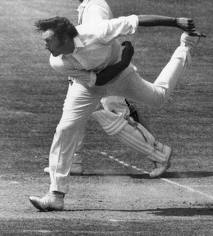Mike Hendrick renews my faith
 Back in the hotel bar, sometime around midnight, Dave (the quiz master) muttered, “That’s Mike Hendrick.”
Back in the hotel bar, sometime around midnight, Dave (the quiz master) muttered, “That’s Mike Hendrick.”
The Turl CC reunion, replacing the annual tour, had started with a washout at Lord’s; progressed to pub (accompanied by Backwatersman), curry house and now we were sharing a bar with an England cricketer of our school-boy days. For some reason (seven pints worth of unreason) I wasn’t satisfied merely to share the bar so walked across, asked if he really was Mike Hendrick. He was. For the next, maybe, hour, he chatted to us. Every question, comment and reminiscence we offered conjured a story from the man. It was a deep, rather drunken, delight.
I had travelled down to London for the reunion that afternoon by train. A day-or-so before I had listened to Couch Talk’s interview with the Indian national team’s performance analyst. Disillusioned by the potential impact of analytics in cricket, I spent a lot of the journey drafting Neutering the intelligent cricketer.
The morning of the second day of the reunion began slowly. The ground at Lord’s needed time to dry out so we didn’t need a rushed cure to our hangovers before gathering there again, this time to see some play. As we watched we pieced together the night before. Not the elemental night out material of who went there and ended up where, but what were the stories Hendrick had told us.
He had been keen to talk about Brearley – the best captain he had played under – how he had asked to go drinking with Hendrick and Old to get to know them better and then his captaincy on the field. This is how I remember the story being told.
I was bowling to Kim Hughes in a Test. I was at the top of my run-up when Brearley runs up from his place in the slips. What’s he want, I think.
“Where are you going out tonight?” he asked me.
“What?”
“Where are you going?”
“Why are you asking me that now?”
Brearley had his back to the batsman. “Look over my shoulder. Tell me what Hughes is doing.”
“He’s scratching around in the crease.”
“Good.”
Brearley kept talking. He asked me to look over his shoulder at the batsman again. “What’s he doing now?”
“He’s still scratching about in the crease.”
“Good. This ball, I want you to bowl the same length as that last delivery, but about three inches further outside his off-stump. Right?”
“OK”
I bowled the next ball, just as he told me and I got it pretty much exactly where he wanted it and you know what? Hughes chased it and was caught by Gower in the covers. What a captain!
It’s a lovely story: self-deprecating – he admits confusion at Brearley’s gamesmanship and then being a bit pleased with himself that he can land the ball where he’s been instructed to – and his veneration for Brearley was touching.
Travelling to London earlier that day, I had been pessimistic about the ‘intelligent cricketer’ preserving his or her advantage in a time of granular analysis of opponents. This story restores my faith.
If that match (Adelaide, 1979?*) was played today, Hendrick and his team-mates would have been briefed on the young batsman’s weaknesses – prone to chasing full balls outside off-stump – and shown video from his previous appearances of his dismissals. Brearley’s brilliant insight would be common knowledge; part of a plan.
But Brearley didn’t just have the insight, he sensed how best to take advantage of the situation: to slow the game down; to make the young batsman impatient; to time the moment when his bowler with great control of line and length should offer up the bait. Brearley’s intelligence encompassed not just his opponent’s vulnerability, but how to prey on that weakness to gain maximum effect.
Alastair Cook was leading England for the 12th time in Tests at Nottingham in July 2013. On day 2 he was confronted by a debutant, Ashton Agar, whose fearless, euphoric batting turned an Australian collapse into a sizeable first innings lead. Cook and his England attack struggled with this unexpected assault.
These are just moments from the careers of two England captains and while I’m wary of cherry-picking to suit my argument, they do seem indicative. One, the more experienced leader, out-thinking the opponent; the other, out of ideas, facing a tenth wicket insurrection that didn’t appear in any of his coaching staff’s plans.
 Hendrick restored my faith in the ability of the intelligent cricketer to make a mark; as well as impressing with his generosity when faced by a group of enthusiasts.
Hendrick restored my faith in the ability of the intelligent cricketer to make a mark; as well as impressing with his generosity when faced by a group of enthusiasts.
* I don’t recall Hendrick stating which match it was, but at The Adelaide Oval, January 1979, Wisden records, “Gower, at square cover, made a brilliant diving catch to dismiss Hughes” from Hendrick’s bowling.
